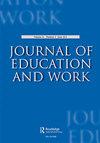低学历工人参与非正规教育的障碍
IF 1.7
Q2 EDUCATION & EDUCATIONAL RESEARCH
引用次数: 1
摘要
摘要尽管技术变革和工作场所数字化的步伐越来越快,但低学历工人参与非正规成人教育的程度仍明显低于其他工人。与此同时,受教育程度低的工人在参与方面也面临许多其他障碍。与他们不参与有关的一个关键问题是,不同类型的感知障碍发挥了什么作用。基于早期的调查,我们已经确定了不参与NFE的倾向性、情境性和制度性障碍。本分两步实证研究的目的是确定低学历工人中这些障碍的结构(第一步)和发生(第二步)。为此,我们使用了专门开发的研究工具非正规教育不参与问卷(NP-NFE-Q)。基于这一经过验证的工具,我们对捷克共和国低学历工人的代表性样本进行了两步实证调查,显示了与工作场所相关的情境障碍的强度,并通过聚类分析区分了非参与者的个体群体。研究结果扩展了成人教育领域的知识,并为低学历工人更高程度地参与NFE提供了实际意义。本文章由计算机程序翻译,如有差异,请以英文原文为准。
Barriers to the participation of low-educated workers in non-formal education
ABSTRACT Despite the increasing pace of technological change and digitalisation of workplaces, low-educated workers continue to participate in non-formal adult education (NFE) to a significantly lesser degree than do other workers. At the same time, low-educated workers also face many other barriers to participation. One key question related to their non-participation is what role the different types of perceived barriers play. Based on an earlier investigation, we have identified dispositional, situational, and institutional barriers to non-participation in NFE. The aim of the present two-step empirical research is to determine the structure (first step) and occurrence (second step) of these barriers in low-educated workers. For this purpose, we have used the specially developed research tool Non-Participation in Non-formal Education Questionnaire (NP-NFE-Q). Based on this validated tool, we have done a two-step empirical investigation on representative sample of low-educated workers from the Czech Republic that shows the strength of situational barriers related to the workplace, and distinguishes individual groups of non-participants through a cluster analysis. The results expand knowledge in the field of adult education and offer practical implications towards the higher participation of low-educated workers in NFE.
求助全文
通过发布文献求助,成功后即可免费获取论文全文。
去求助
来源期刊

Journal of Education and Work
EDUCATION & EDUCATIONAL RESEARCH-
CiteScore
2.70
自引率
14.30%
发文量
40
期刊介绍:
The Journal of Education and Work is an international forum for academic research and policy analysis which focuses on the interplay of the education and economic systems. The journal examines how knowledge, skills, values and attitudes both about and for work and employment are developed within the education system. The journal also explores the various forms of industrial training and accreditation in the economic system, including changes in the economic and industrial infrastructure which influence the type of employees required. Work in the informal economy is also included.
 求助内容:
求助内容: 应助结果提醒方式:
应助结果提醒方式:


